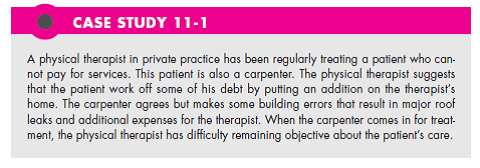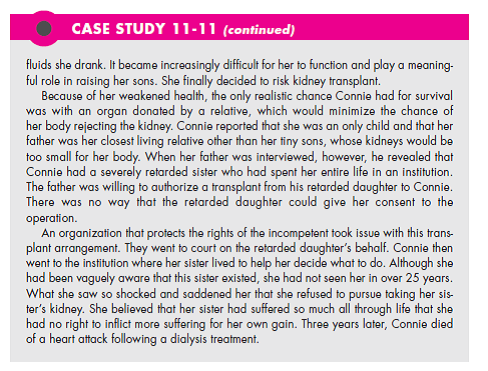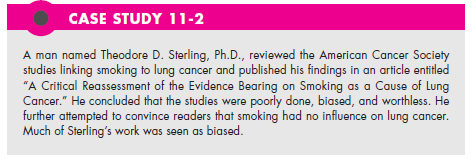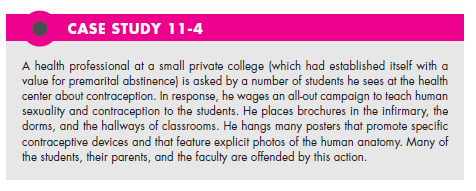Deck 11: Professional Ethics
Question
Question
Question
Question
Question
Question
Question
Question
Question
Question
Question
Question
Question
Question
Question
Question
Question

Unlock Deck
Sign up to unlock the cards in this deck!
Unlock Deck
Unlock Deck
1/17
Play
Full screen (f)
Deck 11: Professional Ethics
1
Case Study 11-10 points out the necessity of humane treatment of experimental animals. Is such an ethical principle necessary?
(In Reference Case Study 11-10)

(In Reference Case Study 11-10)

Several animals are used for experiments for the progress in the knowledge or expansion of human skills. Animals used in experiments should not be exploited but treated humanely.
Animal torture in every way is callous. Animals in laboratories undergo terrifying, enduring, and painful procedures. All these are done for the sole interest of human beings. Animals should be treated gently and caringly, and if they need to be killed it should be done rapidly and painlessly.
In the case mentioned, the researcher treats the rats cruelly and inhumanely by starving them. This is done for the advantage of himself rather than considering the suffering of the animal. Hence, it is certainly an unethical practice.
Animal torture in every way is callous. Animals in laboratories undergo terrifying, enduring, and painful procedures. All these are done for the sole interest of human beings. Animals should be treated gently and caringly, and if they need to be killed it should be done rapidly and painlessly.
In the case mentioned, the researcher treats the rats cruelly and inhumanely by starving them. This is done for the advantage of himself rather than considering the suffering of the animal. Hence, it is certainly an unethical practice.
2
In Case Study 11-1 was the physical therapist unethical or guilty of poor boundaries? Explain.


Ethics refers to a set of moral codes that allows a person to choose right from wrong. Ethical principles are absolute and are important in any kind of profession.
The relationship between the physical therapist and the carpenter cannot be called unethical as there were no abuse treatment of the patient by the therapist. But when the therapist was not satisfied with the work of the carpenter, he developed personal feelings against the carpenter while treating. Hence, he can be considered to be guilty of judgment and the relationship affected the treatment. Therefore, the physical therapist can be considered to be guilty of poor boundaries.
The relationship between the physical therapist and the carpenter cannot be called unethical as there were no abuse treatment of the patient by the therapist. But when the therapist was not satisfied with the work of the carpenter, he developed personal feelings against the carpenter while treating. Hence, he can be considered to be guilty of judgment and the relationship affected the treatment. Therefore, the physical therapist can be considered to be guilty of poor boundaries.
3
Case Study 11-11 has many facets. Think about all of these and discuss with your class.
(In Reference Case Study 11-11)


(In Reference Case Study 11-11)


There are many ethical and moral issues regarding organ transplantation. Taking an organ from a healthy person, even though intended to help another person, is not far from risk.
Carrie, as a young mother of two children, had a long life ahead. Saving her life would have certainly been a major gain. But the only way to do it was to receive kidney from her grieving sister. This is certainly against humanity as the sister herself cannot authorize an informed consent and cannot speak for herself. A transplant procedure involves major risk to the recipient as well as the donor. The donor too has to undergo some amount of pain and distress. Since the donor in this case is unaware about all this and does not even know whether to refuse to the treatment, it is highly unethical or unprincipled for the patient to accept the organ from an already suffering person.
Hence, what Carrie did was certainly right by not giving more misery to her grieving and unwell sister who had suffered a lot in her whole life.
Carrie, as a young mother of two children, had a long life ahead. Saving her life would have certainly been a major gain. But the only way to do it was to receive kidney from her grieving sister. This is certainly against humanity as the sister herself cannot authorize an informed consent and cannot speak for herself. A transplant procedure involves major risk to the recipient as well as the donor. The donor too has to undergo some amount of pain and distress. Since the donor in this case is unaware about all this and does not even know whether to refuse to the treatment, it is highly unethical or unprincipled for the patient to accept the organ from an already suffering person.
Hence, what Carrie did was certainly right by not giving more misery to her grieving and unwell sister who had suffered a lot in her whole life.
4
What ethical violations do you believe would be extreme enough to require loss of licensure or the right to practice?

Unlock Deck
Unlock for access to all 17 flashcards in this deck.
Unlock Deck
k this deck
5
In Case Study 11-2 should there be a ban on research sponsored by commercial interests? What about the liquor industry? What about the tobacco industry? What about the pharmaceutical industry? What about universities? How do you keep research objective?
(In Reference Case Study 11-2)

(In Reference Case Study 11-2)


Unlock Deck
Unlock for access to all 17 flashcards in this deck.
Unlock Deck
k this deck
6
Can you think of a health care example in which the health professional might be found guilty of a crime (legally responsible) but not in violation of an ethical principle?

Unlock Deck
Unlock for access to all 17 flashcards in this deck.
Unlock Deck
k this deck
7
In Case Study 11-3 what harm is there in an occupational therapist filling in for a physical therapist?
(In Reference Case Study 11-3)

(In Reference Case Study 11-3)


Unlock Deck
Unlock for access to all 17 flashcards in this deck.
Unlock Deck
k this deck
8
Can you describe an experiment using human subjects in which a deception might be justified?

Unlock Deck
Unlock for access to all 17 flashcards in this deck.
Unlock Deck
k this deck
9
Refer to Case Study 11-4. Assume you work with a physician group. A patient asks you about having a termination of pregnancy. You are a Roman Catholic. What would you do?
(In Reference Case Study 11-4)

(In Reference Case Study 11-4)


Unlock Deck
Unlock for access to all 17 flashcards in this deck.
Unlock Deck
k this deck
10
You visit a dietitian for advice on how to lose weight. She tells you that she can sell you a vitamin product that will help you to lose weight. Is this ethical behavior? Should she be reported to any professional or licensing agencies?

Unlock Deck
Unlock for access to all 17 flashcards in this deck.
Unlock Deck
k this deck
11
With reference to Case Study 11-5, what is the ethical issue involved in referring to the achievements of one's clinical practice?
(In Reference Case Study 11-5)

(In Reference Case Study 11-5)


Unlock Deck
Unlock for access to all 17 flashcards in this deck.
Unlock Deck
k this deck
12
Your mother has terminal cancer and is going to a skilled nursing facility. The nursing facility director tells you that they will not accept any patient with a "Do Not Resuscitate" order as that is against their religious beliefs. Should you report this to the State Department of Health? What if your physician said that it was perfectly acceptable behavior, and that if you had a problem with it you should simply go elsewhere?

Unlock Deck
Unlock for access to all 17 flashcards in this deck.
Unlock Deck
k this deck
13
Refer to Case Study 11-6. Your boss asks you to use more modalities for physical therapy in order to in-crease billings. You realize that it is common for physical therapists in private practice to use multiple modalities and that your job could be in jeopardy. How would you handle the issue?
(In Reference Case Study 11-6)

(In Reference Case Study 11-6)


Unlock Deck
Unlock for access to all 17 flashcards in this deck.
Unlock Deck
k this deck
14
You smell alcohol on your therapist's breath during a therapy session. But she seems to be perfectly cogent. What would you say? Would you report her to any agency?

Unlock Deck
Unlock for access to all 17 flashcards in this deck.
Unlock Deck
k this deck
15
Refer to Case Study 11-7. Any health professional who is giving advice outside of his or her scope of practice or not referring the patient when he or she is unable to help is guilty of what? Explain.
(In Reference Case Study 11-7)

(In Reference Case Study 11-7)


Unlock Deck
Unlock for access to all 17 flashcards in this deck.
Unlock Deck
k this deck
16
Using Case Study 11-8 as a reference, is it ever advisable to handle ethical matters informally?
(In Reference Case Study 11-8)

(In Reference Case Study 11-8)


Unlock Deck
Unlock for access to all 17 flashcards in this deck.
Unlock Deck
k this deck
17
Examine Case Study 11-9. What is the problem with the students conducting the tests?
(In Reference Case Study 11-9)

(In Reference Case Study 11-9)


Unlock Deck
Unlock for access to all 17 flashcards in this deck.
Unlock Deck
k this deck


